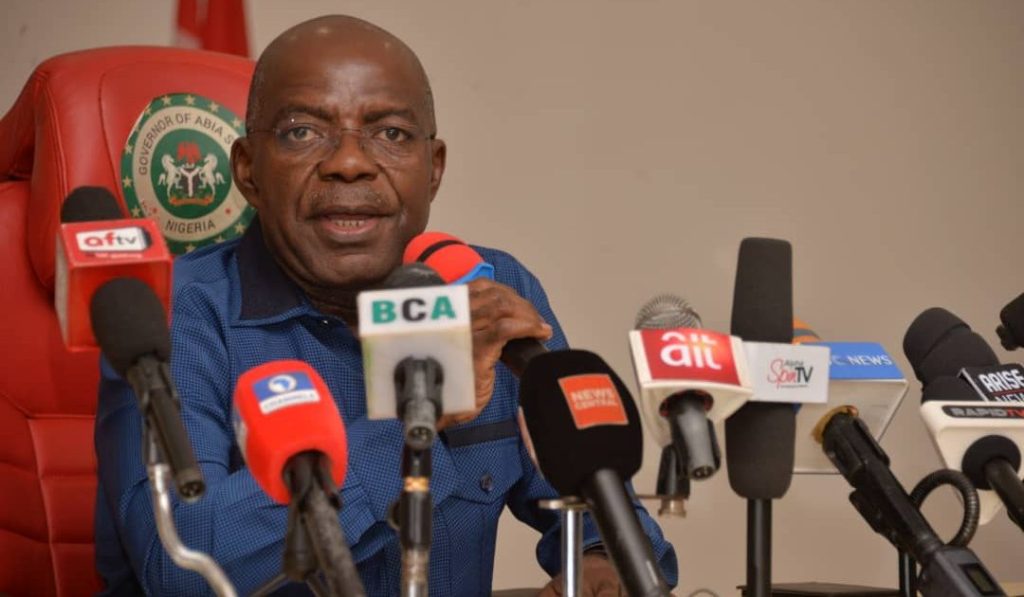The ongoing internal power struggle within the Labour Party (LP) has taken a dramatic turn, escalating into a public war of words between the National Chairman, Julius Abure, and Abia State Governor, Alex Otti. The conflict stems from Otti’s assertion that his faction has successfully wrestled control of the party leadership from Abure, citing a Supreme Court judgment as the basis for his claim. This claim, however, has been vehemently refuted by Abure, who insists Otti’s interpretation of the judgment is flawed and that he remains the legitimate leader of the LP.
The dispute ignited following Otti’s appearance on Arise Television’s Morning Show, where he not only proclaimed his faction’s takeover of the party but also disparaged Abure, accusing him of clinging to power and engaging in self-serving behavior. Otti’s provocative language, using the term “masturbating” to describe Abure’s actions, fueled the fire and elicited a sharp retort from the embattled chairman. Otti’s core argument hinges on his interpretation of a Supreme Court judgment, which he claims validates his faction’s control of the LP. He has offered to provide the judgment to journalists for their review, confident that it supports his claims.
Responding to Otti’s televised assertions, Abure, during an emergency meeting of the party’s National Executive Committee, condemned the governor’s comments as not only misleading but also disrespectful. He accused Otti of being a “dwarfy and Lilliputian” man, not just in physical stature, but also in intellectual capacity. Abure further characterized Otti’s actions as embarrassing, highlighting what he saw as a theatrical display of carrying a Certified True Copy (CTC) of the Supreme Court judgment to the Independent National Electoral Commission (INEC) headquarters. Abure argued that such a gesture was an attempt to intimidate the electoral body, an act which he deemed unworthy of a governor.
Abure vehemently rejected Otti’s interpretation of the Supreme Court judgment, arguing that it explicitly designates matters of party leadership as internal affairs, subject to the party’s constitution. He implied that even those without formal legal training could understand this basic principle. He countered Otti’s claims of a takeover, asserting that he, Abure, remains firmly in control of the LP. He highlighted the instrumental role he and the party played in Otti’s gubernatorial victory, emphasizing the sacrifices and the resistance to bribery and inducements they endured to ensure his success. This support, in Abure’s view, makes Otti’s current stance all the more egregious.
Abure expressed deep disappointment in Otti’s conduct, asserting that it betrayed the values and principles the LP represents. He contrasted Otti’s behavior with the party’s promises to Nigerians of a new breed of leadership and a better Nigeria. Abure questioned whether Otti’s actions reflected the change they had promised the electorate. This public clash between prominent figures within the LP underscores the deep divisions within the party and raises questions about its future direction. The ongoing power struggle threatens to undermine the party’s credibility and could potentially impact its performance in future elections.
The unfolding drama within the Labour Party presents a significant challenge to its stability and cohesion. The conflicting claims regarding the Supreme Court judgment and the acrimonious exchanges between key figures like Abure and Otti create uncertainty and raise questions about the party’s ability to navigate this internal crisis. The resolution of this conflict will be crucial for the party’s future and its ability to maintain its relevance in the Nigerian political landscape. The accusations of misrepresentation and the personal attacks further exacerbate the situation, making a swift and amicable resolution seem increasingly unlikely. This internal rift threatens to overshadow the party’s recent electoral successes and divert attention from its broader political agenda.


